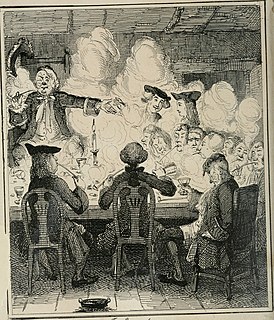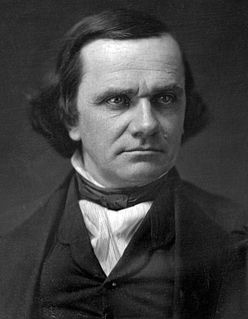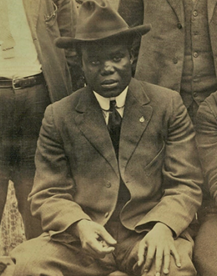A Quote by Oliver Wendell Holmes, Jr.
If there is any principle of the Constitution that more imperatively calls for attachment than any other it is the principle of free thought, not free thought for those who agree with us but freedom for the thought that we hate.
Related Quotes
The only thought in the world that is worth anything is free thought. To free thought we owe all past progress and all hope for the future. Since when has any one made it appear that shackled thought could get on better than that which is free? Brains are a great misfortune if one is never to use them.
I deny the right of Congress to force a slaveholding State upon an unwilling people. I deny their right to force a free State upon an unwilling people. I deny their right to force a good thing upon a people who are unwilling to receive it. The great principle is the right of every community to judge and decide for itself, whether a thing is right or wrong, whether it would be good or evil for them to adopt it; and the right of free action, the right of free thought, the right of free judgment upon the question is dearer to every true American than any other under a free government.
Men fear thought as they fear nothing else on earth - more than ruin, more even than death. Thought is subversive and revolutionary, destructive and terrible, thought is merciless to privilege, established institutions, and comfortable habits; thought is anarchic and lawless, indifferent to authority, careless of the well-tried wisdom of the ages. Thought looks into the pit of hell and is not afraid ... Thought is great and swift and free, the light of the world, and the chief glory of man.
The principle of the Constitution is that of a separation of legislative, Executive and Judiciary functions, except in cases specified. If this principle be not expressed in direct terms, it is clearly the spirit of the Constitution, and it ought to be so commented and acted on by every friend of free government.
It is never to be expected in a revolution that every man is to change his opinion at the same moment. There never yet was any truth or any principle so irresistibly obvious that all men believed it at once. Time and reason must cooperate with each other to the final establishment of any principle; and therefore those who may happen to be first convinced have not a right to persecute others, on whom conviction operates more slowly. The moral principle of revolutions is to instruct, not to destroy.
Man alone, during his brief existence on this earth, is free to examine, to know, to criticize, and to create. In this freedom lies his superiority over the forces that pervade his outward life. He is that unique organism in terms of matter and energy, space and time, which is urged to conscious purpose. Reason is his characteristic and indistinguishing principle. But man is only man -- and free -- when he considers himself as a total being in whom the unmediated whole of feeling and thought is not severed and who impugns any form of atomization as artificial, mischievous, and predatory.
"Freedom" is probably the word he said more than any other. He used the word freedom constantly. I think for some his frequent calls for freedom became a cliché because he did it so often. They didn't get it, but Reagan certainly did. He thought deeply about the relationship between God and human freedom and the nonrelationship between atheistic communism and that freedom.
The most basic principle to being a free American is the notion that we as individuals are responsible for our own lives and decisions. We do not have the right to rob our neighbors to make up for our mistakes, neither does our neighbor have any right to tell us how to live, so long as we aren’t infringing on their rights. Freedom to make bad decisions is inherent in the freedom to make good ones. If we are only free to make good decisions, we are not really free.
I picked such seemingly disparate essays, I thought it was important to say what was the guiding principle in the selection rather than focus on any one essay. I reached for some principle that had been subconscious in me and lifted it into consciousness. Authenticity and sincerity were the most important unifying principles of all these apparently different essays.
I thought that one of the things that we were losing sight of is the basic reasons that we do protect free speech and freedom of the press and the essentiality and centrality in our lives of really giving broad protection to freedom of speech and freedom of the press in America. I thought I could do that by telling stories of some of the cases that established those principles on a real life on the ground basis.
There's a stronger and more kind of controversial element of Plotinus' view of matter, which is that he actually identifies it with evil, or at least the principle of evil, and the reason for this is that he thinks that the the One, the highest principle, can also be thought of as the Good, and that's kind of surprising like, because he has this negative theology which doesn't allow us to say anything about the One. But he believes that it can be seen as the principle of goodness as well as unity, and that if you think about it, goodness and unity sort of go along with each other.


































